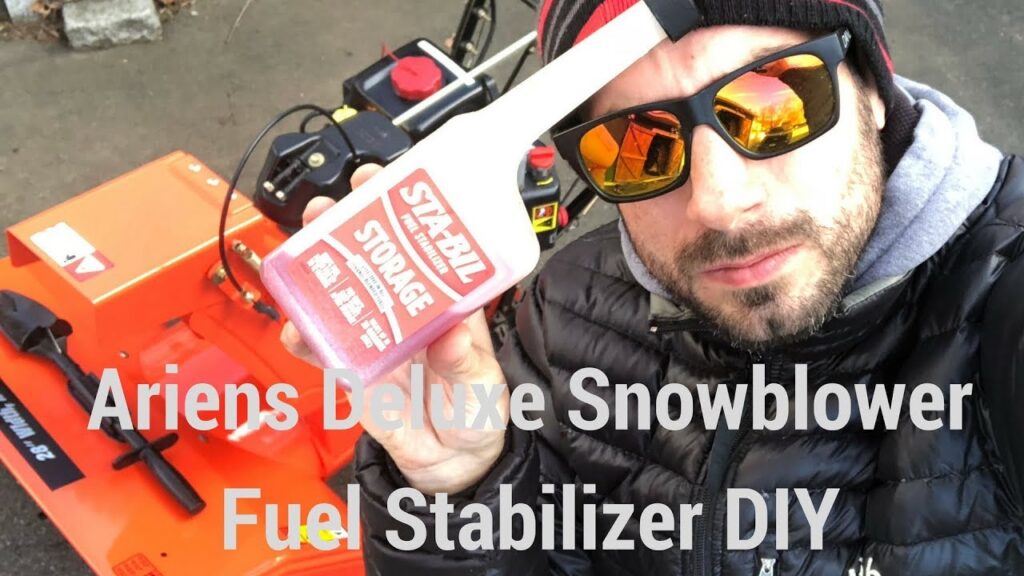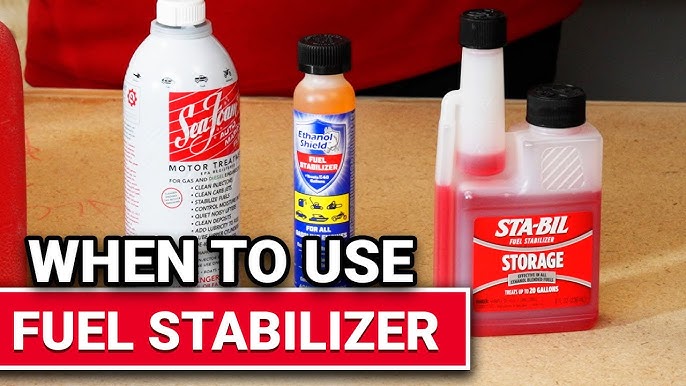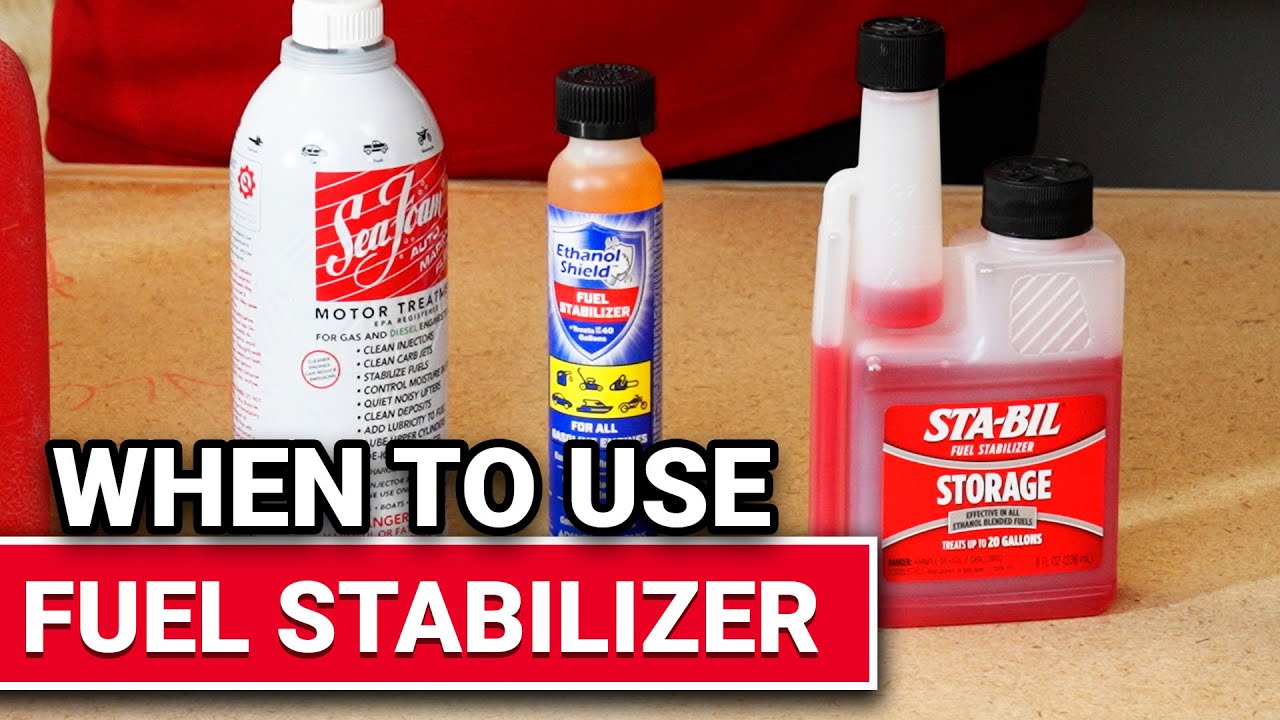Ladies and gentlemen, we are here today to discuss a burning question that has been on the minds of snowblower owners everywhere: should you put stabilizer in your snowblower? Ah, the winter season – a time of cozy nights, hot chocolate, and of course, the relentless battle against the snow. But amidst the excitement of winter wonderlands, one niggling concern may arise: how can we ensure our snowblower stays in top-notch condition? Today, we aim to shed light on this debate surrounding the use of stabilizer in snowblowers, examining whether it is truly a necessary step or merely an optional precaution.
Importance of Stabilizer in Snowblower
When it comes to maintaining the performance and longevity of your snowblower, using a fuel stabilizer is of utmost importance. Snowblowers are seasonal equipment that often sit idle for months at a time. During this period, fuel degradation can occur, leading to various issues when you try to start up your snowblower again. By using a fuel stabilizer, you can prevent fuel degradation, maintain fuel freshness, and improve the overall performance of your snowblower.
Preventing Fuel Degradation
One of the primary reasons to use a fuel stabilizer in your snowblower is to prevent fuel degradation. Over time, fuel can break down and lose its quality, leading to the formation of gum, varnish, and other deposits that can clog the fuel system of your snowblower. This degradation is often accelerated by factors such as exposure to oxygen, moisture, and temperature fluctuations.
By using a fuel stabilizer, you can effectively inhibit the oxidation process and prevent the formation of harmful deposits. This ensures that the fuel remains in its optimal state, reducing the likelihood of clogged fuel lines, carburetor issues, and engine damage.
Maintaining Fuel Freshness
When your snowblower sits idle for an extended period, the fuel in the tank can become stale. Stale fuel is not only less efficient but can also lead to difficulties starting the engine. Fuel stabilizers work by prolonging the freshness of the fuel, allowing it to remain usable even after months of storage.
By maintaining fuel freshness, you can avoid starting problems and ensure that your snowblower is ready to tackle the winter weather whenever you need it. This is especially crucial for regions that experience long periods of snowfall, where snowblowers may be stored for several months without use.
Improving Engine Performance
Using a fuel stabilizer can also have a positive impact on the overall performance of your snowblower’s engine. When fuel degrades or becomes stale, it can lead to reduced combustion efficiency, resulting in decreased power output, rough idling, and potential engine misfires.
By keeping the fuel fresh and free from harmful deposits, a fuel stabilizer helps to optimize the combustion process, allowing the engine to operate at its best. This results in smoother operation, improved fuel efficiency, and more reliable starting, ensuring that your snowblower performs at its peak when you need it most.
Factors to Consider Before Using Stabilizer
Before using a fuel stabilizer in your snowblower, there are a few factors to consider. These factors will help you determine the right type of stabilizer, the correct mixing ratio, and the most effective usage methods.
Type of Fuel
The type of fuel used in your snowblower plays a significant role in selecting the appropriate stabilizer. It is essential to ensure compatibility between the stabilizer and the fuel to achieve optimal results. Most snowblowers run on either gasoline or a gasoline-ethanol blend.
Storage Duration
The length of time your snowblower will be stored is another crucial factor to consider. If you live in an area with long winters and extended periods of snowfall, your snowblower may remain idle for several months. In such cases, a longer-lasting fuel stabilizer may be necessary to maintain fuel freshness throughout the storage period.
Climate Conditions
The prevailing climate conditions in your area can affect fuel stability. Extreme temperature fluctuations and high humidity levels can accelerate fuel degradation, making the use of a stabilizer even more crucial. Consider the climate of your region when choosing a fuel stabilizer that is formulated to withstand the specific conditions your snowblower will face during storage.

This image is property of www.goldeagle.com.
Types of Fuel Stabilizers
Fuel stabilizers come in various types, each designed to address specific needs and fuel compositions. Understanding the different types of stabilizers will help you make an informed decision based on your snowblower’s requirements.
Ethanol Fuel Stabilizers
Many modern fuels contain ethanol, which can pose challenges to fuel stability. Ethanol fuel stabilizers are specifically formulated to counteract the negative effects of ethanol on fuel quality. These stabilizers prevent phase separation, corrosion, and other issues that can arise from using ethanol-blended fuels, ensuring optimal performance.
Non-Ethanol Fuel Stabilizers
For snowblowers using non-ethanol fuels, there are stabilizers available that are tailored to these fuel types. These stabilizers are designed to protect against fuel degradation, maintain freshness, and improve engine performance without the specific focus on ethanol-related issues.
Multi-Purpose Fuel Stabilizers
If you have multiple small engines or equipment that require fuel stabilizers, opting for a multi-purpose stabilizer can offer convenience and versatility. These stabilizers are formulated to work well with various fuel types, making them suitable for snowblowers as well as other power equipment you may own.
Benefits of Using Fuel Stabilizer
Using a fuel stabilizer in your snowblower provides a range of benefits that significantly contribute to the longevity and reliability of your machine. Let’s explore some of the key advantages of incorporating a fuel stabilizer into your snowblower maintenance routine.
Prevents Fuel Separation
One of the primary benefits of using a fuel stabilizer is its ability to prevent fuel separation. Ethanol-blended fuels are prone to phase separation, where ethanol and water separate from the gasoline. This can lead to engine damage and starting issues when the snowblower is not used for an extended period.
A fuel stabilizer acts as a protective barrier, preventing the ethanol from absorbing moisture and causing separation. By stabilizing the fuel composition, the stabilizer ensures that the gasoline, ethanol, and water remain evenly mixed, reducing the risk of costly engine repairs and improving overall performance.
Reduces Carburetor Issues
Fuel degradation can result in deposits and varnish formation in the carburetor, leading to performance problems in your snowblower. These issues can range from difficulty starting the engine to inconsistent power delivery and poor throttle response.
By using a fuel stabilizer, you significantly reduce the likelihood of such carburetor problems. The stabilizer’s additives help keep the fuel system clean, preventing the buildup of deposits and varnish. This results in smoother operation, improved fuel flow, and better combustion efficiency, allowing your snowblower’s engine to run optimally.
Protects Fuel System Components
The fuel system components of your snowblower, including fuel lines, filters, and carburetors, can suffer from wear and damage caused by degraded fuel. Deposits and contaminants that form due to fuel degradation can clog fuel lines and filters, leading to reduced fuel flow and potential engine damage.
Using a fuel stabilizer helps protect the fuel system components, keeping them clean and free from harmful deposits. This ensures proper fuel delivery, prevents clogs, and prolongs the life of the fuel system, ultimately saving you time and money on costly repairs.

This image is property of www.snowblowersdirect.com.
Proper Fuel Stabilizer Usage
To reap the full benefits of a fuel stabilizer, it’s essential to understand and follow the proper usage guidelines. Here are some key considerations when using a fuel stabilizer in your snowblower.
Reading the Manufacturer’s Instructions
Before using any fuel stabilizer, it is crucial to read and understand the manufacturer’s instructions provided with the product. These instructions outline the specific recommendations, mixing ratios, and usage guidelines for the stabilizer.
Determining the Correct Mixing Ratio
Fuel stabilizers are typically added to the fuel tank in precise ratios to ensure optimal performance. The correct mixing ratio can vary depending on the brand and type of stabilizer you choose. Consult the product instructions for guidance on the appropriate amount of stabilizer to add based on the fuel tank capacity.
Adding Stabilizer in the Fuel Tank
Once you’ve determined the correct mixing ratio, add the fuel stabilizer directly into the fuel tank that is filled with fresh fuel. Avoid adding the stabilizer to old or stale fuel, as its effectiveness may be reduced. It is recommended to add the stabilizer at the beginning of the snowblower’s storage period to maintain fuel freshness throughout.
Effectiveness of Fuel Stabilizer
The effectiveness of a fuel stabilizer is crucial to the success of using it in your snowblower. Let’s explore some factors that determine its overall effectiveness.
Long-Term Fuel Stability
A good fuel stabilizer should maintain fuel stability over an extended period, ensuring that the fuel remains fresh and usable throughout storage. By inhibiting oxidation and preventing the formation of harmful deposits, the stabilizer should allow the fuel to retain its quality, leading to easier starting and improved performance when you need to use your snowblower.
Compatibility with Snowblower Engines
It is important to choose a fuel stabilizer that is compatible with the specific engine technology used in your snowblower. Some stabilizers may not work as effectively with certain engine types, potentially leading to reduced performance or other issues. Check the product specifications and compare them to the requirements of your snowblower’s engine to ensure compatibility.
User Experiences and Feedback
To gauge the effectiveness of a fuel stabilizer, it can be beneficial to read user experiences and feedback. Online reviews, forums, and discussions with other snowblower owners can provide valuable insights into the results achieved with various fuel stabilizers. This information can help guide your decision and ensure that you choose a stabilizer with a track record of positive outcomes.

This image is property of i.ytimg.com.
Alternatives to Fuel Stabilizer
While using a fuel stabilizer is highly recommended for snowblower maintenance, there are a few alternative methods you can consider. Let’s explore these alternatives and their pros and cons.
Emptying the Fuel Tank
One way to prevent fuel degradation is to empty the fuel tank completely before storing your snowblower. By removing all the fuel, you eliminate the risk of degradation and potential starting issues. However, this method may not be practical for everyone and requires careful handling and disposal of the fuel.
Running the Snowblower Dry
Similar to emptying the fuel tank, running the snowblower until the fuel is depleted is another alternative. By running the machine without any fuel, you avoid the need for a stabilizer. However, this method may require additional time and effort, as well as potential wear on the engine when operating without fuel.
Using Fresh Fuel Regularly
Another alternative is to use fresh fuel regularly. By using the snowblower frequently and consuming the fuel within a shorter period, the risk of fuel degradation is significantly reduced. While this method requires more regular use of the snowblower, it can be an effective way to avoid fuel stability issues altogether.
Common Myths About Fuel Stabilizers
When it comes to fuel stabilizers, there are a few common myths that can confuse snowblower owners. Let’s debunk some of these myths and provide accurate information about the use of stabilizers.
Stabilizer Damages Snowblower Engines
One common myth is that using a fuel stabilizer can damage snowblower engines. However, when used correctly, a fuel stabilizer should not cause any harm to the engine. In fact, it can help prevent engine damage by maintaining fuel quality and protecting the fuel system components.
Stabilizer Causes Fuel System Clogs
Another myth suggests that fuel stabilizers can cause fuel system clogs. While it is true that some additives can form deposits if used in excessive amounts, following the manufacturer’s instructions and using the correct mixing ratio will ensure that the stabilizer does not cause clogs or other fuel system issues.
Stabilizer is Only for Old Fuel
Contrary to popular belief, a fuel stabilizer is not solely intended for use with old fuel. It can be used with fresh fuel as well to maintain fuel freshness and prevent degradation. Adding a stabilizer to fresh fuel at the beginning of the storage period ensures that the fuel remains in optimal condition until the next use.

This image is property of i.ytimg.com.
Considerations for Different Types of Snowblowers
Different types of snowblowers may have specific considerations when it comes to using a fuel stabilizer. Here are some factors to consider based on the type of snowblower you own.
Single-Stage vs. Two-Stage Snowblowers
Single-stage and two-stage snowblowers may have different fuel requirements and usage patterns. Single-stage snowblowers are typically smaller and may consume less fuel, while two-stage snowblowers are larger and may have higher fuel consumption rates. Consider the fuel tank capacity and consumption rate when determining the appropriate mixing ratio of a fuel stabilizer for your specific snowblower type.
Electric vs. Gas-Powered Snowblowers
Electric snowblowers do not require fuel, eliminating the need for a fuel stabilizer. However, for gas-powered snowblowers, using a fuel stabilizer is essential to maintaining fuel quality and ensuring optimal engine performance. Make sure to select a stabilizer that is compatible with gas-powered snowblower engines.
Compact vs. Large Snowblowers
The size and power output of your snowblower can affect its fuel consumption rate and storage requirements. Compact snowblowers may have smaller fuel tanks and shorter storage periods, while larger snowblowers with higher power output may require more fuel and longer storage durations. Consider these factors when choosing a fuel stabilizer and following the correct usage guidelines.
Conclusion
Using a fuel stabilizer in your snowblower is vital for maintaining fuel freshness, preventing degradation, and improving engine performance. By considering factors such as the type of fuel, storage duration, and climate conditions, you can choose the right stabilizer for your snowblower’s needs.
Whether you opt for an ethanol fuel stabilizer, non-ethanol stabilizer, or multi-purpose stabilizer, the benefits of using a fuel stabilizer are clear. It prevents fuel separation, reduces carburetor issues, and protects fuel system components, ultimately ensuring that your snowblower is ready to tackle the winter weather with ease.
Proper usage of a fuel stabilizer includes reading the manufacturer’s instructions, determining the correct mixing ratio, and adding the stabilizer to the fuel tank filled with fresh fuel. This will effectively maintain fuel stability and optimize the performance of your snowblower.
While fuel stabilizers are highly effective, alternative methods such as emptying the fuel tank, running the snowblower dry, or using fresh fuel regularly can also be considered. Each method has its own pros and cons, and it’s essential to choose the option that best suits your needs and preferences.
Lastly, it is important to dispel common myths surrounding fuel stabilizers, such as the belief that they can damage snowblower engines or cause fuel system clogs. By using a fuel stabilizer correctly and following the recommended guidelines, you can enjoy the benefits without any negative effects on your snowblower.
Considerations for different types of snowblowers, including single-stage vs. two-stage, electric vs. gas-powered, and compact vs. large, should also be taken into account when using a fuel stabilizer.
In conclusion, the decision to put a stabilizer in your snowblower is a personal one based on various factors. However, it is clear that using a fuel stabilizer offers numerous benefits in maintaining the performance and reliability of your snowblower. With the proper usage and consideration of different factors, you can ensure that your snowblower is always prepared to tackle the winter weather with ease.

This image is property of i.ytimg.com.
